Politicians
The Westminster Diet and Health Forum “aims to provide the premier environment where parliamentarians, senior policy advisors, regulators and other decision makers can discuss critical issues, and exchange ideas and information with leaders from industry, responsible interest groups, analysts, academics, journalists and others”.
Their meeting on Thursday 5 July 2007 had the title “Integrating Complementary and Conventional Approaches to Health Care”. Despite some good contributions by Edzard Ernst and Simon Singh, the meeting failed to live up to the aims of the forum, partly because the representatives from the Department of Health failed to turn up (because of the changes following the accession of Gordon Brown), and partly because of the choice of speakers. For a start the audience consisted almost entirely of advocates of various forms of alternative medicine. And the meeting was chaired by David Tredinnick MP (Cons, Bosworth). This is what the BBC News profile says about him.
| David Tredinnick is an old style Conservative MP, being an Eton-educated former Guards officer, who has sat in the Commons since 1987.However, his ambition for high office was thwarted by his role in one of the sleaze stories which helped to sink the Major government.He accepted £1,000 from an undercover reporter to ask parliamentary questions about a fictitious drug.He was obliged to resign from his role as a PPS and was suspended from the Commons for 20 sitting days. He has not sat on the frontbench since.He is an orthodox Conservative loyalist, though he is more supportive of the European Union than many of his colleagues.He has, however, carved himself a niche as the Commons’ most enthusiastic supporter of complementary medicine.He has wearied successive health secretaries with his persistent advocacy of any and all homeopathic remedies.He has also supported their use in prisons and even suggested them as an aid in alleviating the foot and mouth crisis. |
The chairmanship was punctuated by party political speeches, and, more remarkably, by the apparently serious assertion that he was aware of a psychiatric hospital that doubled its staff at full moon (this is an old urban myth, and is, of course, quite untrue). His advocacy of homeopathic borax as a way to control the 2001 epidemic of foot and mouth diease can be read here.
Picture of David Tredinnick MP from the Conservative Party |
 |
Kim Lavely, chief executive of the Prince’s Foundation for Integrated Health (FIH), was chosen as the keynote speaker. She made (several times) the quite remarkable assertion that Prince’s Foundation did not advocate complementary medicine. That’s not quite the impression given by their web site, and I have to say I find the dissimulation of speeches like this hard to take. Just as with her boss, the Prince of Wales, the message seems to be tailored to the audience.Kim Lavely, and Boo Armstrong (of GetWell UK), tried to persuade me that the ‘audit’ of the effects of Pater Hain’s infliction of privatised alternative medicine in Northern Ireland would tell us something useful.Of course it won’t provide any useful information. The efforts of Ben Goldacre to explain to the public what constitutes a trial and what doesn’t have not made much progress here. Edzard Ernst’s request for an example of a treatment that could not be tested in a randomised controlled trial produced no response.
Regulation of complementary medicine is the topic that occupied much of the time. The obvious question is ‘how can one have a professional body for a therapy that doesn’t work?’. This crucial question was consistently ignored. Alternative medicine advocates are mostly desparate to gain respectability by becoming regulated professionals, though only, of course, as along as the regulations do not require them to demonstrate that they can actually benefit patients (see letter to The Times).
The Council for Healthcare Regulatory Excellence (CHRE) is yet another quango. I was unaware of its existence until their “head of Fitness to practice” gave a talk. This organisation gets over £2 million per year of taxpayer’s money. What does it do? Well “CHRE is a statutory overarching body, covering all of the United Kingdom and separate from Government, established from April 2003. It promotes best practice and consistency in the regulation of healthcare professionals by the following nine regulatory bodies”. But these bodies include not only the General Medical Council and the General Dental Council, but also the two forms of alternative medicine that have so far succeeded in getting ‘regulated’ status, the General Chiropractic Council and the General Osteopathic Council (for information on Chiropractic see below and here).
H.L. Mencken (1924) on chiropractic
“This preposterous quackery flourishes lushly in the back reaches of the Republic, and begins to conquer the less civilized folk of the big cities.” (source)
I asked the CHRE representative, Mike Andrews, what would happen if a question of fitness to practice in medicine arose that involved inappropriate use of form of alternative medicine that was also represented by CHRE, but of course I got no answer. Such cases have happened in the UK, for example Dr Marisa Viegas was suspended by the GMC advising a patient to stop heart medication which led to her death. And a Dutch doctor was struck off the register after the death of Sylvia Millecam.
The CHRE seems to be yet another expensive form of ‘box-ticking’ bureaucratic regulation that ends up doing more harm than good. We have become very familiar with such things in universities, where “quality assurance regulators” approve people like Patrick Holford, and pursue policies that end up harming good science, not helping it.
The Islington Tribune (11 May 2007) revealed that spiritual healers are being paid by the NHS. The National Secular Society commented
“Spiritual healers” using up scarce NHS resourcesThe University College London Hospital is to spend £80,000 on testing whether “spiritual healers” can have an effect on cancer. ” ‘Healers’ who wave their hands over the patient and claim to transmit some kind of undefined ‘energy’ “ want to find out whether their efforts increase the number of white blood cells in cancer sufferers. Astonishingly, UCLH has a dedicated team of 10 “healers”, who cost the hospital around £80,000 a year to maintain. They are the idea of department manager Angela Buxton who first became interested in ‘spiritual healing’ after the death of her seven-year-old son from leukaemia. She told the local paper: “Science has not caught up with how it works. Anecdotal evidence shows it works but we need hard evidence.” |
A defence of this procedure was offered in an email from Martin Lerner (Divisional Manager, Cancer Services)’ He cites cancertherapies.org.uk as saying.
“Today we are also entering the era where appropriate scientific studies of complementary therapy will begin to show specific improvements in outcome for some patients.”
Hang on. Aren’t you meant to get the scientific studies before you start treating patients?
Lerner goes on to say
“UCLH does employ the staff and provide some of the budget (about £90,000 this year) towards the cost of this service, with a similar amount raised through charitable fundraising. By making these complementary therapy services an integral part of the clinical service, we show that we take responsibility for the whole of the patient’s wellbeing, . . .”
Spiritual healing clearly comes under the heading of “dishonest placebo effects”. Nobody is disputing the value to some patients of palliative treatments. The placebo effect can be quite powerful. But is seems the proponents of laying-on-of hands have not considered adequately the lying dilemma
The laying-on-of hands also gives rise to the training dilemma. What does it mean to be “trained”, In something that is essentially mumbo-jumbo?. Well this poses no problem for the box-ticking mentality of the corporate administrator, Just tick the box. Here is the application form. It seems that if you can produce a piece of paper saying you are well-qualified in mumbo-jumbo, then everything is fine.
There is more on the box-ticker mentality elsewhere. It is only too typical of the “efficient administration” that results from corporatisation of the health service, and universities, and the removal of power from those who know what they are talking about.

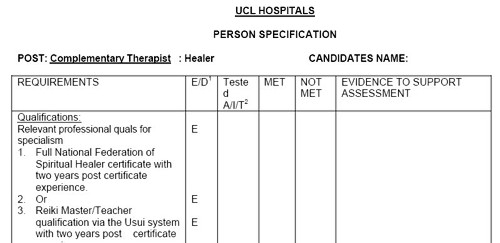
What is the evidence about ‘spiritual healing’ ?
Very little it seems. There is an interesting paper with the title “Psychotherapy and Survival in Cancer: The Conflict Between Hope and Evidence”, by Coyne, Stefanek & Palmer (2007) [download the paper]. They conclude that, despite the popular belief to the contrary, there is little reason to believe that psychotherapy can prolong life in cancer patients. Insofar as complementary treatments are placebos, they count as a form of psychotherapy.
No doubt, mumbo-jumbo can make some people feel better, and to that extent it is justified. But it can and should done be honestly (for example, foot massage is fine, ‘reflexology’ isn’t). Lies to patients should be minimised and universities should not be tempted to hand out certificates in mumbo jumbo.
Postscript
Here is another interesting article on this topic . Attitude doesn’t affect cancer survival. That is based on Optimism and Survival in Lung Carcinoma Patients [download pdf]..
This was posted originally on the old IMPROBABLE SCIENCE page
UCL felled by a herbalist?
OK this isn’t really bad science, but it’s caused inconvenience to me and to readers. It still puzzles me that UCL has not got the resources to deal with a herbalist (the reason that I was given for the move). The herbalist in question, Ann Walker, got rather angry when I called her use of the term ‘blood cleanser’ as gobbledygook
On Friday 1 June, 2007, when it was announced that the IMPROBABLE SCIENCE page had been moved from the UCL server, several people sent letters to the provost. Here is one of them. I have never met Prof Shafer, but his letter, and other similar ones, lightened an otherwise bad day.
| Dear Dr. Grant:I am very sorry to learn that you have requested Dr. Colquhoun to remove his “Improbable Science” web page from the computer system at University College London. It is particularly disheartening to learn that you made this request after receiving a complaint from a practitioner of nonscientific medicine.
I don’t know how many of your faculty publish in Nature (Colquhoun D. Science degrees without the science. Nature. 2007;446:373-4). However, based on my experience at Stanford, I would guess precious few. You now appear to be attempting to squelch his academic freedom, or at least disassociate UCL from his efforts to educate the public about quack science. Perhaps you were put off by the “unprofessional appearance” of the web page. If so then you have misunderstood its purpose. The public is inundated by junk science, A large portion come from the Internet. There are almost no Internet resources where a lay reader can find a counterweight to the extensive claims of pseudoscientists. Dr. Colquhoun’s blog is a unique resource. The format may put off a scientific reader, but it is exactly the format required to get the message to the web surfer with a 10 second attention span. In my view the Improbable Science web page was among the most important public services made available by the University College London. I don’t know the facts of your decision. Perhaps there are policies, procedures, and regulations that Dr. Colquhoun has violated in creating the Improbable Science web page. However, I do know that any request to remove the page that follows a complaint from an individual offended by the page is entirely inappropriate. Even were your request otherwise reasonable, the mere appearance of academic censorship should have been absolutely unacceptable to you. (Think of it like conflict of interest – there is a need to avoid not only true conflict of interest, but the mere appearance of It is thus with shock, sadness, and disappointment that I have learned of this decision by the University College London. I hope that you will reconsider. The present course makes it appear that UCL has caved in to pseudoscientists and is engaged in academic censorship of possibly the most important public service offered by the UCL. Sincerely, Steve Shafer Steven L. Shafer, MD Editor-in-Chief, Anesthesia & Analgesia Professor, Department of Anesthesia, Stanford University Adjunct Professor, Biopharmaceutical Sciences, UCSF Stanford University Medical Center Stanford, CA 94305 |
No doubt it is an exaggeration to say “the Improbable Science web page was among the most important public services made available by the University College London”. But thanks anyway.
After an unrepentant response, Professor Shafer replied thus.
| Dear Provost Grant:I appreciate your taking the time to respond. I’m sure that as provost you live on the receiving end of a firehose of correspondence, as do I as a professor and a journal Editor-in-Chief. I’m sorry to have added to the e-mail overload. I appreciate your finding time to respond.
It would be my hope that Stanford University would shoulder the responsibility of dealing with whatever harassment would come my way by virtue of my scientific and academic pursuits. Yes, when legal action is threatened, and staff are consumed with processing paperwork, I’m sure my Dean, Provost, and President would prefer to ransfer everything to me. However, the effect would be chilling. Universities are supposed to provide a haven to insulate scientists from harassment. I’ve looked at Dr. You note that Dr. Colquhoun “accepts that he needs to be in a position where he shoulders directly the burden of responding to Dr Lakin.” I applaud his fortitude, but note that are only 24 hours in a day. If the administrative resources of University College London are inadequate to respond to Dr. Lakin, how is Dr. Colquhoun, on his own, without the resources of UCL, expected to survive the harassment, legal hallenges, and other pressures to silence him? As a counter example, the University of California at San Francisco stood solidly behind Stanton Glantz when the cigarette industry tried to destroy him for his efforts to expose their activities. Had he agreed to “shoulder directly the burden”, we would never have known of the extensive research conducted by the cigarette industry over two decades that identified the health risks, and guided their extensive disinformation campaign. I would hope that Stanford University would following the UCSF example, and devote the necessary resources to defend my academic freedom, rather than the UCL Again, I appreciate your responding to my e-mail. I hope that my perspective is a least thought provoking on the complex mutual responsibilities between a prestigious University and an equally prominent faculty member with outspoken views. Thank you for your consideration, Sincerely, Steve Shafer |
The Goldacre effect
Saturday 9 June 2007. The wires (and my hit counter) are melting after Ben Goldacre’s comments on the move of this web site from UCL’s servers. That’s understandable: his excellent badscience.net site gets 12,000 hits a day and 95,000 unique visitors per month.
Like all the other comments, his badscience column in today’s Guardian, was not solicited by me, but it’s wonderful to know that somebody cares. His badscience.net version (“The Mighty David Colquhoun” !) was even more over-the-top. I can’t say I’m feeling very “mighty” at the moment.
Goldacre’s piece starts “I’ve always said you’d get a lot more kids interested in science if you told them it involves fighting – which of course it does.” A correspondent today enlarged on the theme “you have got me thinking and yes my kids would be far more interested in science if a playstation game was created whereby Prof. Colquhoun was zapping disgruntled alternative therapists”. The mind boggles. Making money out of selling mindless violence (in the news again today) must be even worse than making money out of selling useless pills. A university should be one of the few places left where one cannot be accused of knowing the price of everything, and the value of nothing.
Contrary to what some people seem to think, I don’t enjoy rows. They keep me awake at night. But some things are just too important to duck out of them.
Read the provost’s reply.
Goldacre has posted the complete text of the provost’s reply to one of the many people who have written to him. You should read the other side of the story too (click here and search for “letter from provost”). Grant has a real problem. He shouldn’t have to spend time fending off herbalists. Yet if they aren’t fended off, more attacks will occur. Who’d be a provost? That is all sorted out now.
One year from our first letter to NHS Trusts, we sent another. Listen to the interview by John Humphrys on the Radio 4 Today Programme, with Raymond Tallis and Peter Fisher. :And hear Fisher suggest that he works for UCL (not true). You can also download a summary of the current evidence in the form of an example commissioning document which accompanied our letter.
May 23, 2007. A year ago, our letter to NHS Trusts urged them to stop paying for “unproven and disproved treatments”. A year on, we sent a second letter. Read it here.
On May 23 2007, John Humphrys introduced coverage of this on the Radio 4 Today Programme with the words
“Doctors who think homeopathy is a waste of time and money seem to be winning the argument”
To listen to his interview with Raymond Tallis and Peter Fisher click here. In the interview, Peter Fisher not only misrepresented the evidence, as usual, but also he said
“We are integrating it [homeopathy] within NHS services in University College London which is one of the leading, you know, biomedical centres in the country.”
Hang on a moment! I’m glad that Fisher thinks that UCL is a “leading biomedical centre”, but he does not work for UCL (which is a university), but for the UCLH Trust, which is an NHS Trust. This shameless attempt to use the reputation of a quite different institution to bolster his case smacks of desperation (not to mention mendacity).
After Fisher’s emphasis on “integration”, Tallis commented
“The use of the word integrate is interesting. I mean I suppose you can regard combining medicines that don’t work with medicines that do work as a kind of integrative approach . . “;
The evidence
Our second letter to NHS Trusts said “If you have not already reviewed your own trust’s provision, you might find it useful to consider, in conjunction with your Director of Public Health, the paper that we have enclosed which, while not a full review of the scientific position, has been used by other trusts to promote evidence based commissioning.”. This letter has a summary of the evidence,
Good reports in the newspapers include
“Hard-up NHS trusts cut back on unproven homoeopathy treatment”: Mark Henderson in The Times
“Doctors renew drive to ban NHS homeopathy”: James Randerson, in the Guardian
[This post has been transferred from my old IMPROBABLE SCIENCE page]
Follow-up
Homeopaths have been harping on about our alleged misuse of the NHS logo, ever since this second letter was sent. It is often said that the letter was sent under the NHS letterhead. As so often, they don’t bother to check. There was no NHS logo on the letter. The only place the logo occurred was on the sample template fo commissioners that was sent with the letter. That template has always been available for download from this post. It is very obviously intended to be a template, with sections that are to be completed by commissioners highlighted. There is no way it could be taken to be representing itself as a letter from the NHS. This is how it starts.

A colleague wrote to his MP to ask if anything could be done about the defrauding of the public by “psychic surgeons”. He wrote, in particular, about Stephen Turoff.
Turoff was the subject of the first episode of “Trust me I’m a Healer”, a programme that looked at “fake psychic healers”. They are the BBC’s own words (see badpsychics.com).

Psychic surgery is nothing but a total hoax.
Psychic surgery was discredited by the U.S. Federal Trade Commission in 1975. In a unanimous opinion, the commission declared that “‘psychic surgery’ is nothing but a total hoax.” Judge Daniel H. Hanscom, in granting the FTC an injunction against travel agencies promoting psychic surgery tours, said: “Psychic surgery is pure and unmitigated fakery. The ‘surgical operations’ of psychic surgeons … with their bare hands are simply phony.” (see here)
Eventually my colleague got an answer from Lord Hunt, junior minister at the Department of Health (generally loyal Blairite, but he did resign over Iraq).
The response makes one wonder what planet the minister is living on Psychic fraud a “profession”? And capable of self-regulation? This letter is just surreal.

Clearly misunderstanding the nature of science is not restricted to any political party. In any case, regulation of crackpot medicine arguably does more harm than good (see Letter to the Times).
Most sorts of crackpot medicine are desperate to be “regulated” by the government. They know that the regulation is ineffective, and they know that it gives them a stamp of government approval with few obligations on their part. They can then claim to be “professional” psychic surgeons
(or whatever) and pretend to be proper doctors. And foremost among those pressing for this sort of phony respectability has been the Prince of Wales Foundation for Integrated Health (see here and here).
An early day motion in support of homeopathic hospitals shows that irrational belief in magic is not unique to one party. Virtually all MPs have no idea about science. But I was quite surprised to find out in a reply from my MP that it is official Conservative policy.
Read more on the original IMPROBABLE SCIENCE page
A new paper, with a very large sample, almost 300 000 men, shows an association between taking large doses of multivitamin supplements and death from prostate cancer. But this, like most observations on diet, was not a randomised study. The paper itself discusses the interpretation carefully. The reports in the newspapers did not.
Read more on the original IMPROBABLE SCIENCE page
Twenty-five hospitals from London and southern and eastern England have already either stopped sending any patients to the Royal London Homeopathic Hospital or agreed to fund only a handful A campaign has started o save it, but the arguments are far from convincing.
This is reposted from the original IMPROBABLE SCIENCE page
The news is out. It was in February this year when I first saw some “Commissioning Intentions 2007-08” documents from several London NHS Primary Care Trusts (PCT), indicating their intention to break their contracts with the RLHH on the very reasonable grounds that homeopathy doesn’t work. It seemed better to wait for the intentions to be implemented before saying much, because of the inevitable outcry from those who want sugar pills at the taxpayers’ expense.
Then, in March 2007, the Health Services Journal carried a story “PCTs consider alternative to homeopathic hospitals” (free registration, or read it here).
|
On 8 April 2007, The Observer carried a special report, prominently featured on page 3.
|
 Fisher and Queen, Observer 8 April 2007 |
Peter Fisher, clinical director of the RLHH, is quoted as saying
“Twenty-five hospitals from London and southern and eastern England have already either stopped sending any patients to the RLHH or agreed to fund only a handful.”
“Prince Charles is sympathetic, supportive and concerned. But he doesn’t feel it’s appropriate to intervene in any way because there’s been some adverse publicity before about him ‘meddling’. ”
Fisher attributes this to the letter sent to PCTs by 13 of us, last May, in which we advocated that the NHS should not be paying for “unproven or disproved treatments”. The leading signatory on this letter, Professor Michael Baum, is quoted in the Observer thus.
“If the Royal London were to close because of PCT deficits we would scarcely miss it”.
“Homeopathy is no better than witchcraft. It’s no better than a placebo effect. It’s patronising and insulting for adults.”
“Instead you could have a centre for palliative and supportive care, which would be of greater benefit and involve half the cost. Rather than losing something, we would gain something.”
The backlash
The reaction seems to have started with a letter from homeopath Carol Boyce. Her letter starts thus.
| ROYAL LONDON HOMEOPATHIC HOSPITAL UNDER SIEGE “Death by stealth. The Royal London Homeopathic Hospital (RLHH) – the visible presence of homeopathy within Britain’s NHS – an institution putting homeopathy in the public mind for the last 150 years – the place where homeopathy was seen to perform so well in the cholera epidemic of the 1840s – is being dealt a DEATH BLOW” |
I’d guess the very first sentence must be something of an embarrassment to the RLHH’s clinical director, who is far too sensible to believe that cholera can be cured by homeopathic sugar pills.
The red herring about cholera is repeated ad nauseam on hundreds of homeopathy sites (though most are curiously silent about whether they really believe that sugar pills can cure cholera). It is based on the report that during the London Cholera epidemic of 1854, of the 61 cases of cholera treated at the London Homeopathic Hospital, 10 died (16.4%), whereas the neighbouring Middlesex Hospital reported 123 deaths out of 231 cases of cholera (53.2%). Apart from the lack of any knowledge of the state of the patients on entry to hospital, it was also the case at the time that conventional medicine was no more based on evidence than homeopathy. Indeed the initial popularity of homeopathy could well have resulted not only from wishful thinking, but also because doing nothing at all (i.e. homeopathy) was less harmful than blood letting. The fallacy of the argument was spotted very early on by Oliver Wendell Holmes (senior) in his famous essay, Homeopathy and its Kindred Delusions.
But medicine moved on and homeopathy didn’t. The history of cholera, like that of tuberculosis, contrary to what is suggested by homeopaths, is a triumph for evidence based medicine. The epidemic was halted not by homeopaths but by the careful observations of John Snow that led to his removing the handle of the Broad Street pump. If medicine had been left to homeopaths, people would still be dying of these diseases.
Carol Boyce invites you to write directly to Queen Elizabeth II, to save the RLHH. She has also started an e-petition on the UK government site. The petition includes the words
| ROYAL LONDON HOMEOPATHIC HOSPITAL UNDER SIEGE
“The RLHH has been part of the Health Service for 150 years. ” “In 2005, 67% of GPs and 85% of practices in it’s [sic] Primary Care Trust, referred patients to the hospital. The hospital provides effective and most importantly, COST-EFFECTIVE treatments.” |
Ms Boyce seems not to have noticed that the Prince of Wales’ own Smallwood report decided that there was not enough evidence to come to firm conclusions about cost-effectiveness.
Peter Fisher himself has appealed for the survival of the RLHH in a letter dated 9 March 2007 [download copy of letter].
“The Royal London Homoeopathic Hospital needs your support
09/03/2007By Dr. Peter Fisher, Homeopath to Her Majesty, the Queen.
There is no silly talk about cholera here, but there is a useful list of Trusts who have decided to abandon "unproven and disproved treatments". Fisher recommends you to read Marcia Angell’s book to learn about the deficiencies of the drug industry. I recommend that too. I also recommend Dan Hurley’s book on the even greater deficiencies of the quackery industry.
Fisher suggests you write to your MP to prevent closure of the RLHH.
I suggest you write to your MP to support closure of the RLHH.
The Times Higher Education Supplement (THES) published another bash at BSc degrees in anti-science. This one was accompanied by a defence from Brian Isbell, head of the department of complementary therapies at Westminster University. Isbell’s defence was different from Westminster’s first defence, but every bit as unsatisfactory, in my view.
Following the kerfuffle caused by Nature, THES asked for 800 words on the same topic, Bachelor of Science degrees in subjects that are anti-science (read it here). Every time I read an official validation document I am reminded inexorably of the inimitable Laurie Taylor, which is why the article starts thus.
| The vice-chancellor of Poppleton University is pleased to announce that the university’s finances have been transformed since the conversion of its old-fashioned department of physics and astronomy into the new department of alternative physics and astrology. Quality is ensured by the course validation and top Quality Assurance Agency rating, both awarded by a distinguished panel of academics with appropriate expertise in astrology. (Apologies to Laurie Taylor.) |
As it happens, Laurie Taylor’s column in the same issue of THES is on “Maintaining Standards”, and is as grimly hilarious as always. And his column in the following week (13th April) was about the report of the external examiner, Professor J.K.L. Anonymous, on the Universlity of Poppleton’s BSc in palmistry (“There were 36 first-class papers, 22 upper seconds and only one marginal failure”. Well, there’s a coincidence.
My piece ends thus.
| If a few vice-chancellors appear to value bums on seats more than honest science they should justify their views in public. |
THES plans soon to bring us some responses from the hitherto elusive vice chancellors. That should be interesting. Well they should have been interesting, but all but four of the sixteen letters that were sent by THES were ignored entirely, and the four replies that were received were deemed to be too boring to publish.
| This was accompanied by an article by Brian Isbell, who is head of the department of complementary therapies at Westminster University. He presumably had a hand in the (unsigned) response of Westminster to the Nature article, but this time the response was rather different (could that be because he’d read my comments on the original response?). This time there was no quoting of bad evidence, or the Society of Homeopaths, but rather a defence based on the fact that BSc degrees in CAM include some real scientific content. Let’s take a look at this new response. Isbell says |  Brian Isbell |
| “The shared philosophy across Westminster’s range of complementary therapy degrees is that students need a compulsory core of health sciences. This includes anatomy, physiology, biochemistry, pathology and differential diagnosis. Phytochemistry and pharmacology are included for degrees in herbal medicine and nutritional therapy.” Brian Isbell |
So on Mondays and Thursdays (for example) the students must believe that response increases with dose, but on Tuesdays and Fridays they are called upon to believe that response decreases with dose.
Isbell admits as much himself when he says “at times students have to work with conflicting scientific models that may not always fit with their clinical practice”. What he does not say is how this absurd conflict is resolved, or how it can be made compatible with science or simple common sense. The course evidently teaches you how to believe several mutually contradictory things at the same time, or at least on alternating days. You don’t need to be a scientist to see that is plain daft.
Not only are some of the doctrines of CAM incompatible with science or common sense, but they are often also incompatible with each other. Homeopaths subscribe to the bizarre doctrine that the less you give the bigger the effect, but herbalists do not. Herbal medicine is nothing other than pharmacology, albeit pharmacology as practised at the beginning of the 20th century, before biological standardisation was introduced to assure constant potency of medicines. So they want to give a sensible dose, but don’t know what it is. Nutritional therapists go to the opposite extreme and want to give huge (and sometimes toxic) doses.
I have been told that herbal medicine students at Westminster are instructed not to talk to the homeopaths in another part of Isbell’s school, because they talk rubbish. They even have separate sections on the university’s intranet, so that one sort of CAM can’t be polluted by the beliefs of a different sort of CAM. Likewise, students of reflexology are taught that a small area on the big toe is connected with the pituitary gland. Not only is this incompatible with physiology, but it is also incompatible with homeopathy, herbal medicine and nutritional therapy.
The department of complementary therapies seems to resemble a collection of religious sects at war with each other, rather than anything recognisable as science.
The second plank in Isbell’s new defence is that students are taught to develop research skills. Homeopathy students get one course (out of 22) called “Methods of Research in Complementary Medicine”, and a project, “Research in Practice”. It is impossible to know what is taught on these courses because the university refuses to release any of the course materials. But I find it hard to imagine that the courses are very critical when the official response from the university cited the Spence (2005) study as though it provided evidence for the efficacy of homeopathy.
If that is the best the teachers can do, what hope is there for the students?
The day after “Science degrees without the Science“ appeared in Nature, the University of Westminster issued a statement . In my view, their statement provides the strongest grounds so far to believe that the BSc is inappropriate.
Let’s take a look at it.
| “The BSc (Hons) Health Sciences: Homeopathy is a fully validated degree that satisfies internal and external quality assurance standards.” |
Well, since the University has so far refused to release any of the documents, it is hard to judge that that validation is worth. The validation documents will, no doubt, appear eventually. Watch this space.One mechanism that is intended to maintain the standard of degrees is the external examiner. Their identities, like almost everything else, are kept secret. In the case of the Westminster BSc in homeopathy, however, we are in luck. According to the Teaching Quality Information (TQI) site, their external examiner is the “Chair of the Society of Homoeopaths”. Since April 2004, that has been Andy Kirk RSHom, a homeopath in private practice, with no degree and no scientific qualifications. He, I imagine, is not likely to question the bizarre homeopathic doctrine that the smaller the dose you give, the bigger effect you get.Correction (4 April 2007). It seems that Westminster supplied wrong information to the TQI site, and the external examiner is not Kirk. They refuse to say who it is. But watch this space.
| “The University’s stance received the backing of the Society of Homeopaths, the UK’s largest register of professional homeopaths”. |
Yes, I’m sure it did. The Society of Homeopaths is an organisation for homeopaths who have no medical qualification. Their scientific credentials can be judged from this quotation from their web site.
“If they are so dilute, how can they work?
After each dilution the mixture is vigorously agitated in a machine that delivers a calibrated amount of shaking. This is called succussion. It is thought that this process imprints the healing energy of the medicinal substance throughout the body of water (the diluent) as if a message is passed on. The message contains the healing energy.”
This is pure gobbledygook. The word “energy” is being used in a way unknown to science. It is mere armwaving in an attempt to ‘explain’ a phenomenon that almost certainly doesn’t occur anyway.
| “In fact there is considerable evidence demonstrating the clinical effectiveness of homeopathic treatment, including a large outcomes study published in 2005, of an analysis of over 23,000 outpatient consultations at the Bristol Homeopathic Hospital, in which more than 7 per cent reported clinical improvement,” |
(Notice the Freudian slip. That should be 70%)
The study to which they allude here has to be the worst paper ever published. It is the infamous Spence (2005) study. Oddly enough, this paper is one that Westminster students were asked to assess critically. Sadly, though, it hasn’t been possible to see any marked answers.
The fact that this is the best evidence that the University can produce in response to criticisms is, perhaps, the best reason ever to think that the material being taught is not, in any sense, science, and is not appropriate for a BSc. It seems that they are hoist by their own petard.
This is reposted from the old IMPROBABLE SCIENCE page
The British Medical Journal (2007, 337, 508 – 509) held a debate on whether or not CAM should be referred for evaluation to the National Institute for Clinical Excellence (NICE) [see it here]. Two of the comments that followed the debate were as follows
|
John R King, Consultant Psychiatrist David Colquhoun (“NICE should not have to evaluate alternative medicine”) makes a better case than Linda Franck et al. Space researchers do not, after all, waste time trying to disprove the beliefs of flat- earthists. Neither would it be helpful for a Nobel prizewinning chemist to stride into a church and denounce the holy water there as nothing more than H2O. There is a very large and ever expanding array of alternative treatments, some more bizarre than others, which could tie up the resources of NICE for an indefinite period. But if people want to believe in them – or in fairies or leprechauns – they should be left in peace to do so. It is no concern of scientific medicine. |
|
David Colquhoun, UCL Nobody is proposing to ban fairies or leprechauns. It would be both undesirable and impossible. There does seem to be a case, though, for not providing leprechauns at the tax payers’ expense. And really all leprechauns that are sold to the public should have labels that don’t make false claims for their powers. Unfortunately the MLRA (Medicines and Leprechauns Regulatory Agency) has let us down in the matter of labelling. I suspect infiltration of the Department of Health by little green men |
Channel 4 TV, Monday 12th March. This is the title of the Channel 4 TV documentary, Dispatches.
Lord Wedderburn, QC, a life peer and Emeritus Professor of Law at the London School of Economics, tells the programme:
“If, in fact, nothing changed and he became King, then there would be a most almighty fuss and controversy, and eventually the whole fabric of the constitutional monarchy could be threatened.”
The Prince’s Foundation for Integrated Health (FIH) is the Prince’s lobby group which attempts to make the hard-pressed NHS spend more money on unproven and disproved treatments. The FIH publishes “Complementary Healthcare: a Guide for Patients”. This document is not just barmy, but positively dangerous. In the rebuttal of the programme on the FIH web site, they claim that they do not promote alternative medicine, but elsewhere on the site they state their aim as “makes safe and effective complementary therapies available to patients in conjunction with conventional healthcare”.
Which would be all very well if they didn’t consistently ignore the evidence for effectiveness.
The MHRA recently, for the first time, betrayed its brief to nake sure that medicines work and are safe. This action has been condemned by just about every professional organisation. Nobody knows exactly what caused them to lose their heads in this way, but it is clear that they were under pressure from both the Department of Health and from the Prince of Wales. The Department of Health is clearly sympathetic to quackery, as shown by the letter below, and by their refusal to allow alternative medicine to be referred to NICE for assessment.
| The MHRA admit to having had at least seven letters form the Prince of Wales, and we know that an MHRA member has met the Prince at Clarence House at least once. But all the contents are secret from the public. The Chairman of the MHRA Agency Board, Prof Alasdair Breckenridge, and chairman of their Herbal Medicines committee, Prof Philip Routledge, have both admitted to me to having had pressure from the Prince of Wales, but neither will give any details, despite having been condemned by their own professional organisation, the British Pharmacological Society. | 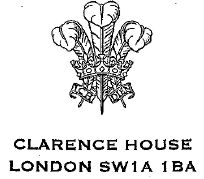 |
The Pharmacological Society’s statement read thus.
| The British Pharmacological Society believes that any claim made for a medicine must be based on evidence, and that it is the duty of the regulatory authorities, in particular the MHRA, to ensure that no claims can be made for the efficacy of any form of medicine unless there is good evidence that the claim is true. Despite many years of investigation, we have no convincing scientific evidence that homeopathic remedies work any better than placebo. Pharmacologists have noted frequently that most homeopathic products are diluted to the extent that they contain no molecule of active ingredient, that is, no medicine, which is highly misleading to consumers who are unlikely to recognise the expression “30C” for example. Furthermore, there are serious concerns, even in cases where they are used for minor ailments, that officially endorsed use of such remedies may put patients at risk of delayed diagnosis. The Society is therefore surprised that the national rules scheme for licensing homeopathic products, which came into force on 1 September (Statutory Instrument 2006 1952), will regard non-scientific data as evidence of efficacy. |
An excellent article on this topic was published by Rose in The Biologist, British health care regulation moves away from science.
The appalling treatment of Professor Edzard Ernst
| Edzard Ernst was the UK’s first professor of complementary medicine, and he is rather unusual in that field because he is totally honest, and very careful about evidence (something that has not always endeared him to the alternative medicine industry).
A letter was sent from Clarence House to the vice-chancellor of Exeter University, Steve Smith. The letter alleged a breach of confidence by Ernst. Having been sent a draft of the Smallwood report, Ernst was so horrified by the scientific standards in that document, he felt obliged, in the public interest, to speak out about it. Ernst was contacted by a newspaper, which had a copy of the draft, and described the initial findings as “outrageous and deeply flawed”. He added: “It is based on such poor science, it’s just hair-raising. The Prince … also seems to have overstepped his constitutional role” |
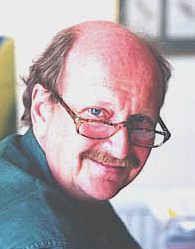
Prof Edzard Ernst. |
Prof Ernst was doing exactly what academics are meant to do. As a result he was subjected to a very prolonged disciplinary procedure, and for a year it was not obvious whether he’d keep his job. For a Prince, in a constitutional monarchy, to put pressure on a university to silence a conspicuously honest academic is just not acceptable.
The Prince of Wales behaviour was bad enough, but, to be generous, he is perhaps, a well-meaning but poorly educated man, filling in his time as best he can.
| In the story of Edzard Ernst, the behaviour of the Vice-Chancellor of Exeter University, Prof Steve Smith seems to me to be unforgivable. Instead of supporting his staff, and supporting academic freedom, he appeared to cower before the Clarence House letterhead. After keeping Prof Ernst on tenterhooks for an entire year he eventually deigned not to fire him in the most grudging and unpleasant way imaginable. |
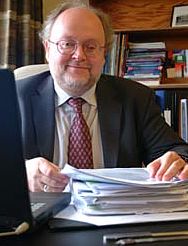 Prof. Steve Smith, Vice chancellor. |
That is illustrated by the end of Smith’s letter to Professor Ernst on 13th October 2006. It was shown on the TV programme, and is reproduced below.

Click to enlarge
The Daily Mail also has features on the healthiness of HRH’s own food lines, after his criticism of MacDonalds, Dutchy Original Sins, and here.
They are worth reading because the advice comes from Catherine Collins, a real dietician, not a nutribollocks guru.
Some responses The story was reported round the world.
Max Hastings (Guardian)
“To make good use of evidence, it is essential to possess not only intelligence, but a capacity for disciplined analysis. The prince has considerable virtues, a good heart notable among them. But he has always lacked discipline in his life and in his treatment of issues. Again and again, he gets himself into trouble by seeking to address matters that are, frankly, beyond his intellectual reach.”
This post has been transferred from the old IMPROBABLE SCIENCE page.
On Monday 5 Feb 2007, the BBC ran a piece entirled Alternative therapy put on trial. It started
“An experiment in allowing NHS patients easier access to alternative and complementary therapies has been launched by NI Secretary Peter Hain.”
| But it is NOT a trial, and NOT an experiment. Journalists seem incapable of understanding the meaning of these words, and the result is irresponsible reports (though one might detect a hint of irony in the picture that the BBC used to illustrate acupuncture; right). |
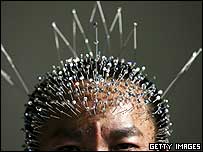 |
There is nothing new in the failure of journalists to distinguish good science from junk. We saw this very clearly in the case of the phoney fish oil “trials” going on in Durham (see Ben Goldacre’s account of these).
In the case of Durham the effect is to use public money to produce bad evidencethat can be used to promote the dubious claims of a private company, in the case “Eye Q” pills made by Equazen.
In the case of Northern Ireland, £200,000 of taxpayers’ money will be paid to a private company, GetwellUK, GPs in two areas will be able to refer patients for therapies like acupuncture, homeopathy and massage. Nothing there about seeing whether the treatments work! But Peter Hain seems to think he knows the answer already. He said
“I am certain, as a user of complementary medicine myself, that this has the potential to improve health substantially,”
He was “delighted that Northern Ireland is leading the way in integrating complementary and alternative therapies into the National Health Service”
Peter Hain used to be something of a hero to me. In the 70s his work for the Anti-apartheid movement was an inspiration (see his autobiographical notes). Now he has sunk to promoting junk science. Very sad.So what is Hain’s attitude to alternative medicine, and how did he come to ally himself with the batty medical opinions of the Prince of Wales? On his web site he had a section on this topic. For some reason it has now been deleted, but thanks (again) to Google’s cache, here is a quotation from a speech he made to The Prince of Wales Foundation for Integrated Health (12th October 2005).
|
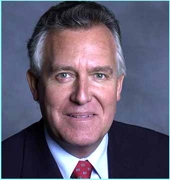 Peter Hain now 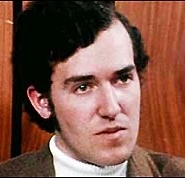 Peter Hain in 1970 |
So instead, we turned to complementary medicine. And with the help of homeopathy and tight restrictions on the sort of food that our son could eat – avoiding in particular wheat and milk products- both ailments went away.”
Hang on! You changed diet and gave homeopathic sugar pills. And that is a reason for the taxpayer to fund homeopathy? Any fool can see that this anecdote means that either (a) change in diet helped, (b) homeopathy helped, or (c) the eczema would have got better anyway. According to the National Eczema Society, “60-70% of children are virtually clear of the condition by the time they reach their mid-teens”. They “grow out” of it. Evidently a First Class Honours Degree in Economics and Political Science is not enough to teach Peter Hain what constitutes evidence and what does not.
On the other hand, the in the same speech Peter Hain also said
“I would certainly never advocate the squandering of public money on so called treatments that have no proven benefits and which take money away from existing therapies that are shown to work.”
But they have “no proven benefits”. Just how inconsistent can you get?
Who are GetwellUK?
GetwellUK is a private company financed largely by taxpayers’ money. And guess who supports it? The Prince of Quacks, once again exerting his unconstitutional influence on public policy. This is done partly through yet another of the Prince’s lobby groups, “GP Associates” (report in BMJ). It seems that “GP Associates” was the forerunner of the recently-launched “Integrated Health Associates”. The inaugural meeting of Integrated Health Associates” was sponsored by a drug company, Solgar Vitamins, a purveyor of unnecessary ‘supplements’ that is a trading arm of Boots Herbal Stores (no connection with that other well-known purveyor of misleading information, Boots the Chemists).
The Company says Support came from the government in February 2005 when the Parliamentary Under-Secretary for the Department of Health, Melanie Johnson, said in the House of Commons, “I thank the hon. Gentleman for notice of the question in relation to Get Well UK. We understand the benefit that many people get from complementary therapies. Local commissioning is a matter for local discretion, but we can see the benefits to local practices of an intermediary pulling together a range of services in the area for alternative medical treatments.” [Hansard].
“We were delighted to be selected as one of the first investees of Futurebuilders – a Treasury fund established to assist capacity building in community organisations who deliver public sector services. The investment will help Get Well UK to serve more NHS patients.”
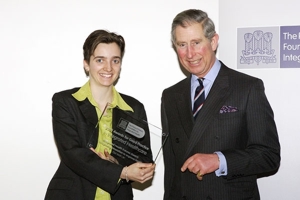
Prince of Wales with Boo Armstrong (Managing director of Getwell UK)
GetWellUK publish an evaluation of a “pilot project” in London, “Does it Work?”, by Nicola Robinson (Head of the Centre for Complementary Healthcare & Integrated Medicine,Thames Valley University).
The report tells us nothing whatsoever about the effectiveness of the treatments, because the “pilot” study was not designed to do so. It is 40 pages of waffle.
The report also says “Get Well UK is a not for profit organisation established in response to a recommendation by the House of Lords in 2000 that complementary therapies should be made available through the NHS. This is a gross misrepresentation of the House of Lords report which said this should be done ONLY if the treatments worked better than placebo. And, with very few exceptions, that still remains to be shown.
For their efforts in setting back medicine to the 19th century, they have had money from UnLtd Ventures (“provides consultancy support to a number of outstanding social entrepreneurs” and taxpayers’ money from Futurebuilders. And they are getting £200 000 of taxpayers’ money from Paul Goggins, the Northern Ireland Health Secretary
At the end of the “pilot scheme” there will have been no proper assessment of the effectiveness of the treatments. We shall be none the wiser.
Misleading advertising of magnets. Office of Fair Trading acts
A major problem in stopping CAM fraud is the generally toothless attitude of the Advertising Standards Authority and of the Office of Fair Trading. Not this time though. The OFT Press Release reads thus.
“The OFT is seeking an injunction preventing publication of advertisements making the following claims about the company’s products:
- the products have a therapeutic effect, caused by a specified physiological mechanism, due to the magnets they contain
- the therapeutic effect of the products, due to the magnets they contain, is clinically proven or established by scientific trials, or is widely accepted in the scientific or medical communities
- unqualified claims the products have a therapeutic effect and/or that wearing products containing magnets will always produce such an effect, due to their magnets
- that products magnetise or ionise water as a result of the magnets they contain.
Magno-Pulse Limited contends that the advertisements are not misleading and has refused to stop publishing adverts making these kinds of claims. Accordingly, the OFT has issued proceedings so the courts can decide the matter. Magno-Pulse Limited has indicated it intends to defend the proceedings.
Christine Wade, Director of Consumer Regulation Enforcement said:
“Where advertisements claim products have therapeutic effects it is important they do not mislead consumers. The OFT is asking the High Court to decide if Magno-Pulse Limited?s advertisements are misleading.”
It cannot have escaped the attention of the PPA (above) that this action makes them look pretty foolish.
Let’s hope the High Court is not fooled.
Magnets: ruling against false advertising
The amazing decision of the Prescription Pricing Authority to allow the NHS to pay for magnetic bandages has been covered in detail here (part 1, part 2, part 3), as has the extreme reluctance of the PPA and the Department of Health to give any useful information (here, and here). More on this topic elsewhere. Eventually the decision was referred to the Office of Fair Trading has delivered its judgement. MagnoPulse Limited was told to remove most of its absurd claims from its advertising.
It remains to be seen whether the PPA admit their mistake and reverse their decision.
In the course of a long correspondence with the MHRA about their endorsement of a dishonest label for a herbal preparation, arnica gel, I eventually got an admission from them that the stuff doesn’t work.
For earlier episodes in this saga, see part 1, part 2, part 3 and part 4.
| “As you have clearly identified the Directive is far from perfect. The vast majority of herbal products currently on the UK market without claims are of unproven benefit.” Dr Linda Anderson, B.Pharm., PhD, Pharmaceutical assessor at the MHRA. |
Which herbal medicines have been assessed by the Regulator?
|
“Both these kinds of medicines are regulated by the MHRA and meet assured standards.” would, by most people, be interpreted to mean that the MHRA was providing some sort of asssurance that the stuff worked. It doesn’t. This wording is, to my mind, misleading and disgraceful.
